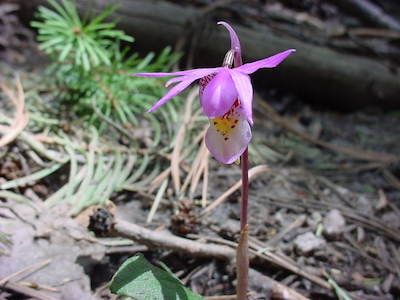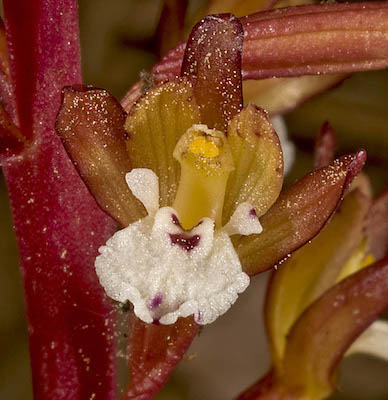 Fairy Slipper Orchid
Fairy Slipper Orchid
 Spotted Coralroot Orchid
Spotted Coralroot Orchid
Photos of two orchids found in the Gila region Courtesy of Dale A. Zimmerman Herbarium, WNMU
At the meeting of the Gila Native Plant Society on Friday, February 16, 2018, noted botanist Richard Felger will present a talk entitled "March to the North: the Last Tropical Orchid". Orchids, oaks, agaves, yuccas, daturas, cacti and so many other plants are hugely diverse towards the tropics but only a few march to the north. Dr. Felger will seek to address these questions: How do the poleward outliers achieve their northern march? How do they differ east and west of the North American continental divide? And how do they compare with their counterparts in the Old World and in the Southern Hemisphere?
Richard Felger has been a biologist since childhood. He received his Ph.D. at the University of Arizona. His dissertation analyzed the vegetation and flora of the islands and Gulf Coast of Sonora, Mexico. Subsequently he was on the faculty of the University of Colorado, Boulder, and then Senior Curator of Botany at the Los Angeles County Museum of Natural History. Returning to Tucson, he continued his research in deserts worldwide and has published in fields of botany, ethnobiology, and new arid-land food crops. He has been active in international conservation, including pioneer conservation of sea turtles on the Pacific Coast of the Americas. Richard is a researcher with the University of Arizona Herbarium. He lives in Silver City with his wife Silke Schneider and their many animals and plants.
Meetings of the Gila Native Plant Society are held the third Friday of the month at 7.00 p.m. in Harlan Hall, second floor, Room 219, corner of Alabama and 12th Streets, on the Western New Mexico University campus. Free and open to the public. Refreshments following the program.
The Gila Native Plant Society is committed to promoting education, research and appreciation of the native flora of the Southwest, encouraging the preservation of rare and endangered plant species and supporting the use of suitable native plants in landscaping. For information on programs, publications and membership, please visit www.gilanps.org.